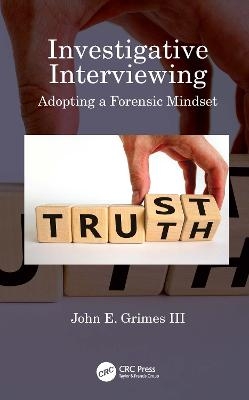
Investigative Interviewing
CRC Press (Verlag)
978-0-367-77146-1 (ISBN)
Investigative Interviewing: Adopting a Forensic Mindset is a straight-forward, practical textbook outlining proper interview planning and techniques, detailing all relevant case law concerning confessions.
Being a forensic professional infers that investigator apply the highest standards in collecting, analyzing, preserving, and presenting evidence to a court of law or other tribunals. The author contends that the key to a proper forensic interviewing methodology is the elimination of the term "interrogation," and the confession-obtaining mindset it creates.
Forensic interviewers can achieve all interview objectives, including truthful confessions that stand up to the scrutiny of the courts and public opinion, by adhering to best-practice, ethical standards. What transpires during the interview must stand up to the scrutiny of the courts and public opinion. In this regard, due process, documenting the procedure, and practicing proven, effective techniques is paramount to getting to the truth—the ultimate goal of any investigation.
The book addresses important issues in the field such as false confessions, due to its criticality and frequent occurrences of this. Coverage also includes the desired qualities of an investigative interviewer and strategies to break down barriers and gain trust with reluctant, uncooperative, and hostile interviewees. Proper report writing, an underrated key to any interview and investigation, is addressed in detail. Lastly. the book provides training on best practice interview steps and strategies to lead the interviewee to the truth. Numerous case examples, and transcripts of real interviews, are provided illustrate real-world interviewing practices and concepts.
Features includes:
Examines the human factor in the qualities of a good investigative interviewer such as understanding the offender and strategies to gain the interviewees trust
Shares practical experience and best practices, noting traditional pitfalls and mistakes that can impede the truth and lead to false confessions
Discusses legal considerations, case law, and the intent behind entering an interview situation with a forensic mindset, prioritizing due process and documenting procedure
Presents a notable and extensive case study that includes six informative interviews denoting effective techniques in practice
Provides pedagogical elements including chapter learning objectives and end of chapter review with discussion questions
Investigative Interviewing: Adopting a Forensic Mindset promotes legal and ethical investigative interviewing methods and is a welcome addition to the literature for use in forensic science and criminal justice curricula and programs.
John E. Grimes III, MS, CFI, CFE is an adjunct instructor at Stevenson University in Maryland. He developed and teaches the graduate-level course, Investigative Interviewing, in the Forensic Studies Program. He speaks at, and presents for, government and private entities. He retired in 2016 as the Chief Inspector with the Amtrak Office of Inspector General, having performed many in-house training sessions with Amtrak working there since 1993. In addition, he is a Certified Forensic Interviewer (CFI) and a Certified Fraud Examiner (CFE).
I: Due Process, The Foundation of Investigative Interviewing, 1: Due Process and Case Law, 2: Interviewing Union Employees. 3: Confessions, 4: False Confessions, II: The Human Factor, 5: Investigative Interviewer Desired Qualities, 6: Understanding the Interviewees, 7: Understanding the Offender, 8: Breakdown in Internal Controls, 9: Breaking Down Barriers and Gaining Trust, 10: Evaluating Non-Verbal Response, III: The Interview, 11: Preparing for and Arranging the Interview, 12: Beginning the Interview, 13: Evaluating and Handling Denials, 14: Questions, Responses, Follow-Up, 15: Leading the Interviewee to the Truth, 16: End, Evaluate, Follow-Up, 17: Writing a Report of Interview (ROI), IV: Case Study, Appendix A, Appendix B
| Erscheinungsdatum | 12.08.2021 |
|---|---|
| Zusatzinfo | 5 Tables, black and white; 2 Line drawings, black and white; 4 Halftones, black and white; 6 Illustrations, black and white |
| Verlagsort | London |
| Sprache | englisch |
| Maße | 156 x 234 mm |
| Gewicht | 689 g |
| Themenwelt | Geisteswissenschaften ► Psychologie ► Allgemeine Psychologie |
| Geisteswissenschaften ► Psychologie ► Test in der Psychologie | |
| Naturwissenschaften ► Biologie | |
| Recht / Steuern ► EU / Internationales Recht | |
| Recht / Steuern ► Strafrecht ► Kriminologie | |
| Recht / Steuern ► Strafrecht ► Strafverfahrensrecht | |
| ISBN-10 | 0-367-77146-2 / 0367771462 |
| ISBN-13 | 978-0-367-77146-1 / 9780367771461 |
| Zustand | Neuware |
| Haben Sie eine Frage zum Produkt? |
aus dem Bereich


